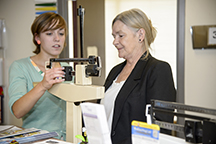September 11, 2014
Purdue Family Health Clinics in Carroll and White Counties earn national recognition
 |
|
At the Family Health Clinic of Delphi, breast cancer survivor Linda Ruhlander receives care from a variety of Purdue University healthcare instructors and interns, including Jessie Renie, (at left) a dietetic intern. The Delphi clinic and the Family Health Clinic of Monon in White County are the first nurse-managed clinics in Indiana to be recognized by the National Committee for Quality Assurance as Patient-Centered Medical Homes. (Purdue University photo/Mark Simons) |
WEST LAFAYETTE, Ind. — Purdue University’s Family Health Clinics in Carroll and White counties are the first nurse-managed clinics in Indiana to be recognized by the National Committee for Quality Assurance as Patient-Centered Medical Homes (PCMH).
The Family Health Clinic of Carroll County and the Family Health Clinic of Monon in White County are federally qualified health centers affiliated with and managed by the Purdue School of Nursing. The clinics, which operate in medically underserved areas of Indiana, received a PCMH Level 2 recognition valid for three years. The designation is a model that uses evidence-based, patient-centered processes focused on care coordination and communication to transform primary care into what patients want it to be, said Daniel J. “Jim” Layman, executive director of both clinics. Research has shown that medical homes can result in higher quality and lower costs and improve patients’ and providers’ reported experiences of care.
“We believe in the philosophy of PCMH, but to get there we had to put ourselves in the shoes of our patients and, from that viewpoint, spend almost a year standardizing processes and creating efficiencies that keep the patient front and center,” Layman said. “Meeting the PCMH standard meant understanding our patients’ experience from the time they made an appointment to the interval following treatment and referral. Applying performance improvement methodologies to the process helped us assess our current state, map out processes for improvement and implement practical solutions.”
Of the 12,000 patient visits to clinics annually, many are made by people who are uninsured or under-insured. Faculty from the Purdue School of Nursing launched the clinics in the mid-1990s to respond to this patient population, and some faculty continue to practice in them. They oversee Purdue students from multiple professions, such as nursing, pharmacy and nutrition science, who have the opportunity to learn how primary care works, and how their roles can complement each other to provide high-quality healthcare.
“The clinics are a unique model for federally qualified health centers as they are both nurse-managed as well as affiliated with a university,” said Jane Kirkpatrick, head of Purdue’s School of Nursing. “The recognition as a level 2 PCMH is more evidence that this model of care is effective and meaningful.”
Layman said the university’s healthcare outreach initiative, Purdue Healthcare Advisors (PHA), also was instrumental in working with clinic leadership to ensure a patient-centric approach.
“Rather than waiting for PCMH recognition to be mandated for all federally qualified health clinics, administrators decided on a proactive approach with guidance from PHA,” Layman said.
“The key components to PCMH include keeping written standards; acting on patient feedback; adapting to the patient’s cultural and linguistic needs; advanced electronic health records systems charting and tracking; and using information technology to enhance preventive care, care coordination and treatment of chronic conditions,” said Natalie Stewart, managing adviser of Purdue Healthcare Advisors. “To put the patient at the center of the care cycle, the clinics chose to expand office hours into the evenings as well as stay open through lunch. They also focused on getting feedback from the specialists to whom they referred patients and making sure patients actually went to these appointments.”
ABOUT PURDUE HEALTHCARE ADVISORS
Purdue Healthcare Advisors (PHA) was established in 2005 by the Purdue University Technical Assistance Program, the Regenstrief Center for Healthcare Engineering, and the Indiana Hospital Association to improve healthcare quality, safety and efficiency by applying the principles of engineering, management, and science.
ABOUT THE FAMILY HEALTH CLINICS OF CARROLL COUNTY AND MONON
Family Health Clinic of Carroll County and the Family Health Clinic of Monon (White County) are two Purdue University School of Nursing affiliated nurse-managed clinics that operate in medically underserved areas of Indiana to provide basic healthcare services annually to more than 5,000 patients, many of whom are uninsured or under-insured as well as a growing Hispanic and Latino population. Services include health promotion, education, acute illness care, and the monitoring of stable chronic conditions. The clinics operate under local governance provided by the community-based North Central Nursing Clinics’ board of directors.
ABOUT THE NATIONAL COMMITTEE FOR QUALITY ASSURANCE
The National Committee for Quality Assurance (NCQA) is a private, nonprofit organization dedicated to improving health care quality. NCQA accredits and certifies a wide range of health care organizations. It also recognizes clinicians and practices in key areas of performance. NCQA’s Healthcare Effectiveness Date and Information Set (HEDIS) is the most widely used performance measurement tool in health care.
Sources: Jeanine Parsch, communications and marketing for Purdue Healthcare Advisors, 765-337-7047, jeanine@purdue.edu
Andy Reynolds, assistant vice president of marketing and communications at NCQA, (202) 955-3518
Jim Layman, 765 564-3016, laymand@purdue.edu
Related websites:
College of Health and Human Sciences